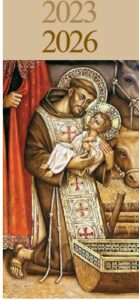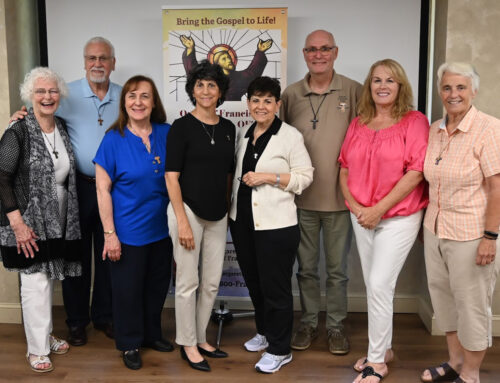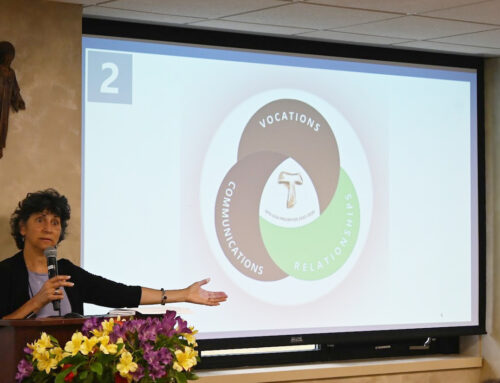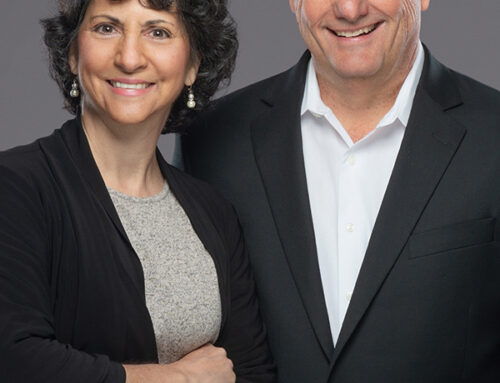(This article originally appeared in the TAU-USA Fall Issue 2022 #107)
Texts
1 Celano 84-87, FF 466-471; Admonitions I, 16-21, FF 144; Letter to the Entire Order 26: 29, FF 221; Office of the Passion XV, FF 303.
 When Thomas of Celano presents the story of the celebration of Christmas at Greccio, he talks about the reasons Francis of Assisi had for to setting up the manger and celebrating the Mass in a cave. The Poverello stopped at Greccio because he wanted to contemplate the realness of the Incarnation, namely, the simplicity, poverty and humility of the Son of God “who gave Himself for us with supreme and indescribable love” (1 Celano 30: 87, FF 471). We find the same dynamic in his contemplation of the Eucharist. In fact, Francis invites us not only to see with our physical eyes but with our spiritual eyes as well, so that we might contemplate the humility and the real manifestation of divine love present in the Eucharist: “Behold, each day He humbles Himself as when He came from the royal throne into the Virgin’s womb; each day He Himself comes to us, appearing humbly; each day He comes down from the bosom of the Father upon the altar in the hands of a priest” (Admonitions I, 16-18, FF 144).
When Thomas of Celano presents the story of the celebration of Christmas at Greccio, he talks about the reasons Francis of Assisi had for to setting up the manger and celebrating the Mass in a cave. The Poverello stopped at Greccio because he wanted to contemplate the realness of the Incarnation, namely, the simplicity, poverty and humility of the Son of God “who gave Himself for us with supreme and indescribable love” (1 Celano 30: 87, FF 471). We find the same dynamic in his contemplation of the Eucharist. In fact, Francis invites us not only to see with our physical eyes but with our spiritual eyes as well, so that we might contemplate the humility and the real manifestation of divine love present in the Eucharist: “Behold, each day He humbles Himself as when He came from the royal throne into the Virgin’s womb; each day He Himself comes to us, appearing humbly; each day He comes down from the bosom of the Father upon the altar in the hands of a priest” (Admonitions I, 16-18, FF 144).
As the Franciscan Family celebrating the centenary of the Christmas at Greccio, we are invited to pause before the mystery of the Incarnation in order to contemplate the depth of God’s love for humanity. The Son of God becomes the Son of man; he becomes one of us, our brother (cf. Second Version of the Letter to the Faithful 56, FF 201). Our faith in the Incarnation prompts us to discover the seeds of the Word present in all cultures and in contemporary society, so that we might bring to bloom the seeds of humanity we find there. Moreover, it urges us not only to defend life but also to become instruments of life and humanity in our families and fraternities, reaching out to those who are seen as social rejects, who are no longer considered human. The concrete way that Francis of Assisi celebrated the mystery of the Incarnation at Greccio, invites us to more fully realize “that we have been entrusted with a treasure which makes us more human and helps us to lead a new life. There is nothing more precious which we can give to others” (Evangelii gaudium 264).
On Christmas day, the Poverello, together with his brothers, prayed: “This is the day the Lord has made let us rejoice and be glad in it. For the Most Holy Child has been given to us and has been born for us on the way and placed in a manger because he did not have a place in the inn” (Office of the Passion XV, 5-7, FF 303). As we celebrate the centenary of the manger at Greccio, we are invited to think about the place that Jesus occupies in our hearts, and even more, whether we have a place in our hearts for those with whom Jesus wanted to be identified: “Amen, I say to you, whatever you did for one of these least brothers of mine, you did for me” (Mt 25:40). By his Incarnation, Christ Jesus eliminated any distance that separated him from humanity. He calls us to do the same, that is, to be close to our brothers and sisters to welcome them, to touch them with mercy, as the Magisterium of the Church reminds us: “With the simplicity of that sign, Saint Francis carried out a great work of evangelization… In a particular way, from the time of its Franciscan origins, the nativity scene has invited us to ‘feel’ and ‘touch’ the poverty that God’s Son took upon himself in the Incarnation. Implicitly, it summons us to follow him along the path of humility, poverty and self-denial that leads from the manger of Bethlehem to the cross. It asks us to meet him and serve him by showing mercy to those of our brothers and sisters in greatest need” (Admirabile signum 3).
Our being in Christ
“For God so loved the world that he gave his only Son” (Jn 3:16).
Objective
To renew our life of faith so that it can become more incarnational and concrete.
Activities
- Raise our awareness of daily life, with all its joys and difficulties, as a privileged place of encounter with the Lord.
- Ensure that adequate importance is placed on the liturgical and sacramental life, in order to progress in the life of faith.
- Reexamine how we celebrate Christmas and other liturgical feasts, ensuring they reflect the simplicity, poverty and humility that Francis of Assisi desired.
Our being brothers and sisters
“Consider, O human being, in what great excellence the Lord God has placed you, for He created and formed you to the image of His beloved Son according to the body and to His likeness according to the Spirit” (Admonitions V, 1, FF 153).
Objective
To develop a more comprehensive view of humankind and its inherent male-female reciprocity, a view that is free of divisions and dichotomies.
Activities
- Ensure that the formation programs in our fraternities implement a formation process that is more comprehensive from a human, spiritual and interpersonal point of
- Encourage concrete initiatives that work toward overcoming discord between men and women or between the laity and priests or consecrated
Our being in communion
“Hail, O Lady, Holy Queen, Mary, holy Mother of God, Who are the Virgin made Church” (Salutation of the Blessed Virgin Mary 1, FF 259).
Objective
To live in minority as members of the Church.
Activities
- Confirm whether our pastoral service in ecclesial communities reflects the maternal dimension of the Church and is characterized by humility and poverty, which are revealed in the Incarnation and in the
- Reexamine our way of celebrating the Eucharist, so that it may be authentically experienced as the source and summit of Christian life and a source of communion and
- Bring the motherly compassion of the Church to our brothers and sisters who find themselves on the existential outskirts of our ecclesial
Our being in the world
“God said: ‘Let us make human beings in our image, after our likeness’” (Gn 1, 26).
Objective
To love and serve every human being, promoting his or her dignity as a person created by God and made in his likeness and image.
Activities
- Set aside time for reflection and discussion on promoting the dig- nity of every human life and make a commitment to defend life from conception until natural
- Promote activities to defend the rights of
- Offer help to parents who are finding it difficult to raise and educate their
- Provide assistance to shelters for orphaned children, street children, young people suffering from any kind of addiction, etc.
Part 1 Posted January 2, 2023 pages 4-6
Part 2 Posted January 9. 2023 Pages 7-9




Nice to be up dated about the centenaries